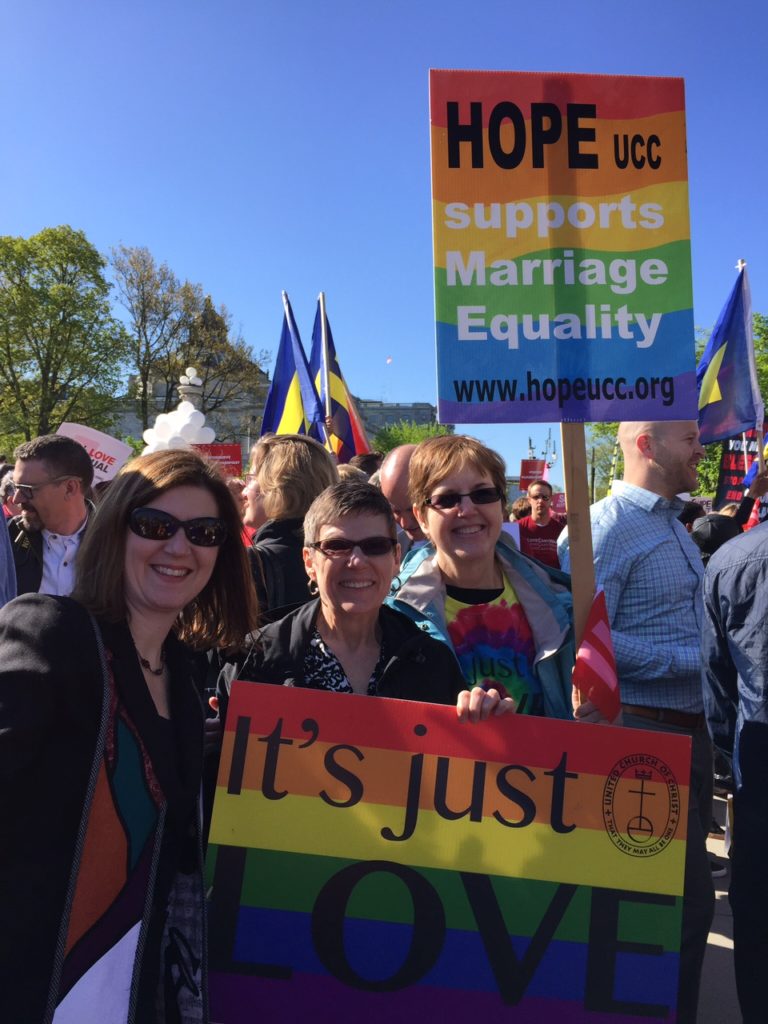Marriage equality advocates flock to D.C. for Supreme Court oral arguments
Clergy and members of the United Church of Christ rallied in front of the U.S. Supreme Court building on Tuesday, April 28, to stand in support of marriage equality as the court heard oral arguments on the issue. The deeply-divided justices heard arguments for nearly three hours, and their decision, expected in late June, will determine whether same-sex marriage becomes legal nationwide, or whether states will retain the authority to rule on the matter.
Bishop Yvette Flunder, senior pastor of City of Refuge UCC in Oakland, Calif., and presiding bishop of The Fellowship of Affirming Ministries in San Francisco, addressed the crowd of more than 1,000 people, the majority of which were same-sex marriage supporters.
“Today, we anticipate a process that culminates in a good and just decision. Same-gender families in our country must have access to all the benefits of marriage,” Flunder said. “We know that it is time to end this struggle for LGBT equality and equality for all. We stand with all those living in the shadow of a dream that folks continue to hold hostage.”
The Rev. Mike Schuenemeyer, UCC executive for health and wholeness advocacy, was also in Washington, D.C. He was one of about 75 people from the faith community who on Tuesday morning marched from the Lutheran Church of the Reformation to the steps of the Supreme Court building, where he said the crowd was “overwhelming supportive” of same-sex marriage. He also noted a strong turnout from pastors and lay members of the UCC.
“There was an overwhelming turnout of groups and people in support for marriage equality,” Schuenemeyer said. “The crowd was excited and eager to join together and demonstrate their support for all the plaintiffs in the case. It was a very exuberant moment when the plaintiffs came out of the court building.”
According to news reports, the court was deeply divided as the justices debated whether states should be forced to recognize same-sex marriages. The arguments were divided into two parts: whether the U.S. Constitution’s guarantees of due process and equal protection under the law mean states must allow gay couples to marry, and whether states must recognize same-sex marriages that take place out-of-state.
The justices expressed doubts about whether the laws banning same-sex unions are constitutional, as well as a reluctance to change the long-established institution of marriage. The arguments centered on gay marriage bans in Kentucky, Michigan, Ohio and Tennessee, four of the 13 states that currently prohibit it. The court’s four liberal justices seemed to lean in support of gay marriage, while the court’s conservative members seemed to favor the right of individual states to decide.
“I don’t think people will be surprised if there is a ruling for marriage equality at the end of June, and we hope that will happen,” Schuenemeyer said. “But the court can rule in any way it chooses. It’s now in their hands, and we wait for that decision.”
“We are not rioting – we are petitioning the justice system peacefully,” Flunder said. “But we will not stop until our families are affirmed. Get this right, Supreme Court. Be known as the court that put this issue to rest.”
Related News
A Moment of Silence
The weekend news was alarming. Two students shot and killed with 9 injured at Brown University...
Read MoreIn hope-filled worship service, UCC and United Church of Canada celebrate full communion past and future
On Saturday, Dec. 13, many from the United Church of Christ (UCC) and the United Church of...
Read More‘A Gift of God to the World:’ Christmas greetings from the General Minister and President
As Christmas quickly approaches, UCC General Minister and President/CEO the Rev. Karen Georgia...
Read More


